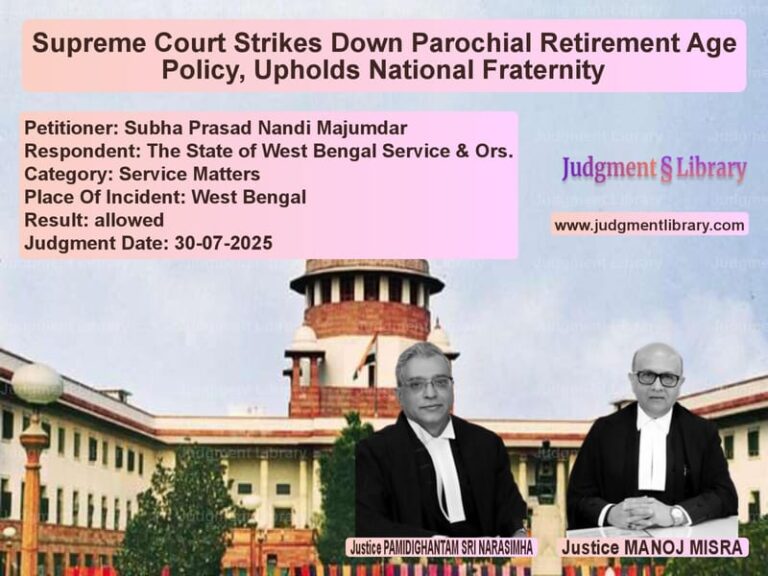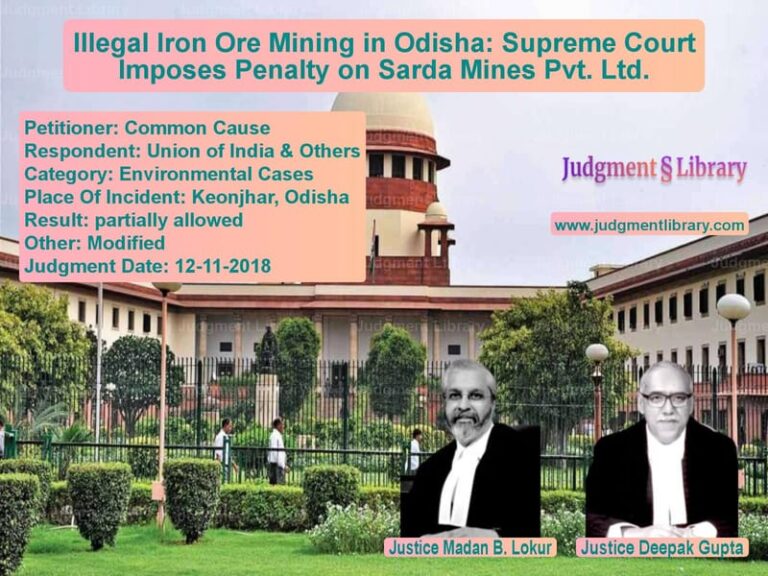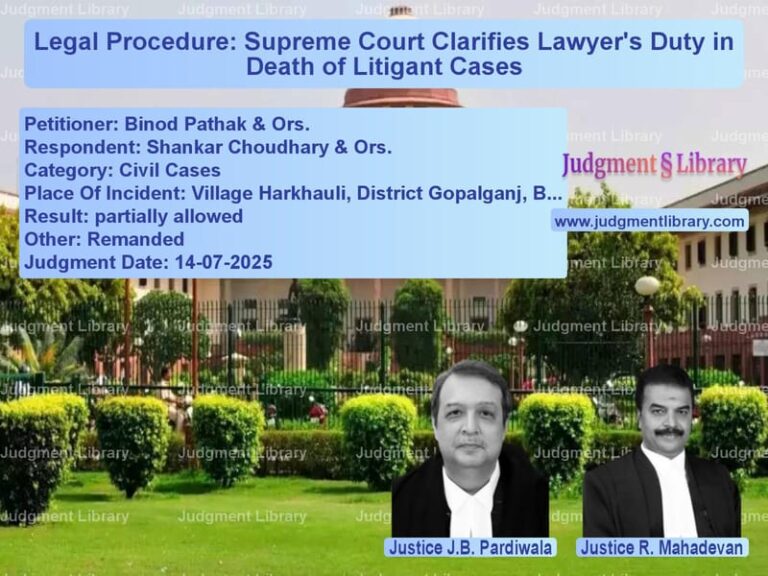Supreme Court Quashes FIR Under UP Gangsters Act: A Landmark Judgment on Misuse of Anti-Gang Laws
In a landmark ruling, the Supreme Court of India quashed an FIR filed under the Uttar Pradesh Gangsters and Anti-Social Activities (Prevention) Act, 1986, against the appellants, citing that the allegations were primarily civil in nature and did not justify the application of the stringent anti-gang law.
The case involved appellants Jay Kishan, Kuldeep Katara, and Krishna Katara, who were accused of being members of a gang involved in various criminal activities. The appellants had challenged the FIR, arguing that it was based on property and financial disputes that were already subject to civil litigation. The High Court of Allahabad dismissed their plea, which led to an appeal before the Supreme Court.
Background of the Case
The FIR in question was lodged at Police Station Bamrauli Katara, Agra, on 26.11.2023. It was based on three previous criminal cases against the appellants:
- CC No.119/2022 under Sections 395/427/506 of the IPC
- CC No.58/2023 under Sections 420/406/120B/504/506 of the IPC
- CC No.60/2023 under Sections 120B/420/406/506 of the IPC
The FIR alleged that the appellants were part of an organized gang involved in criminal activities, necessitating action under the UP Gangsters Act.
Arguments by the Petitioners
The petitioners, represented by senior counsel, argued that the allegations against them were purely civil in nature and did not warrant prosecution under the Gangsters Act. They contended:
- The disputes arose from property transactions and financial disagreements between private parties.
- CC No.58/2023 was related to a failed property transaction where the buyer had not paid the full agreed price.
- CC No.60/2023 involved an exchange deed where both parties had taken possession of their respective properties.
- CC No.119/2022 was lodged by an alleged tenant claiming illegal eviction, which the appellants refuted by asserting ownership.
- The criminal cases were being used as a tool to exert pressure in ongoing civil litigation.
The counsel for the petitioners stated:
“The allegations do not relate to any anti-social activity. A purely civil dispute is being given a criminal color by the complainant. The invocation of the Gangsters Act in this case is a blatant misuse of the law.”
State’s Arguments
The State of Uttar Pradesh, through its counsel, opposed the appeal, arguing that the appellants were hardened criminals operating a gang engaged in extortion, fraudulent property dealings, and intimidation. The counsel stated:
“The petitioners are involved in a series of criminal activities. The FIR is backed by a legally approved Gang Chart. The allegations must be thoroughly investigated before any relief is granted.”
Respondent No.5’s Contentions
Respondent No.5, who had filed one of the predicate criminal cases, contended:
“The predicate offenses in the criminal cases clearly disclose criminal intent. The appellants have used violence, threats, and coercion to gain financial advantage. The Gangsters Act is meant to prevent such activities, and its invocation in this case is justified.”
It was further argued that civil proceedings do not negate criminal liability:
“The pendency of a civil suit does not exonerate the accused from criminal charges. The courts have consistently held that civil and criminal remedies can coexist.”
Supreme Court’s Observations
The Supreme Court examined the definitions of “gang” and “gangster” under the Act and emphasized that mere allegations without substantive evidence cannot justify prosecution under the stringent law.
The Court observed:
“The right to life and liberty under Article 21 of the Constitution cannot be overlooked merely because criminal cases have been registered against a person. The severity of the allegations must be established with concrete evidence.”
The Court further analyzed the FIR and remarked:
“The allegations in the present FIR appear vague and lack specific instances of organized criminal activity. The threshold required for invoking the Gangsters Act has not been met.”
Key Judicial Precedents Cited
- Mohammad Wajid v. State of Uttar Pradesh (2023 SCC OnLine SC 951): The Court reiterated that when FIRs appear to be motivated by personal vengeance, courts must scrutinize them closely.
- Iqbal Singh Marwah v. Meenakshi Marwah (2005) 4 SCC 370: The ruling reaffirmed that civil and criminal liabilities can be pursued simultaneously.
- Md. Rahim Ali v. State of Assam (2024 SCC OnLine SC 1695): Emphasized that penal statutes must be strictly construed.
Final Verdict
The Supreme Court quashed the FIR, holding that the invocation of the Gangsters Act was unwarranted. The judgment stated:
“In the present case, the underlying allegations do not meet the criteria under Section 2(b) of the UP Gangsters Act. The FIR and subsequent proceedings are accordingly quashed.”
The Court, however, clarified that this ruling does not affect the pending criminal and civil cases, which will proceed on their merits.
Conclusion
This judgment serves as a vital precedent in preventing the misuse of anti-gang laws for settling civil disputes. It underscores the importance of applying stringent laws only in cases of actual organized crime, ensuring that individuals are not unjustly prosecuted under draconian provisions.
Petitioner Name: Jay Kishan and Ors..Respondent Name: State of Uttar Pradesh and Ors..Judgment By: Justice Sudhanshu Dhulia, Justice Ahsanuddin Amanullah.Place Of Incident: Agra, Uttar Pradesh.Judgment Date: 12-02-2025.
Don’t miss out on the full details! Download the complete judgment in PDF format below and gain valuable insights instantly!
Download Judgment: jay-kishan-and-ors.-vs-state-of-uttar-prade-supreme-court-of-india-judgment-dated-12-02-2025.pdf
Directly Download Judgment: Directly download this Judgment
See all petitions in Bail and Anticipatory Bail
See all petitions in Fraud and Forgery
See all petitions in Judgment by Sudhanshu Dhulia
See all petitions in Judgment by Ahsanuddin Amanullah
See all petitions in allowed
See all petitions in Quashed
See all petitions in supreme court of India judgments February 2025
See all petitions in 2025 judgments
See all posts in Criminal Cases Category
See all allowed petitions in Criminal Cases Category
See all Dismissed petitions in Criminal Cases Category
See all partially allowed petitions in Criminal Cases Category







